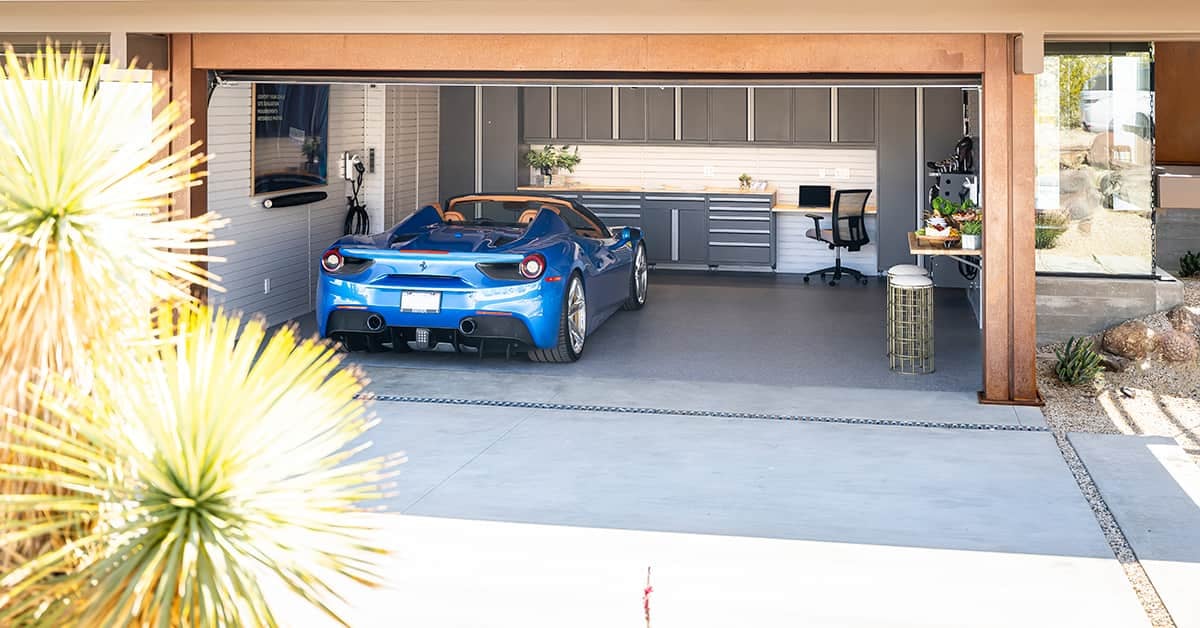 Soundproofing your garage can be useful if you or a family member frequently works on cars, carpentry projects, or plays musical instruments. By soundproofing your garage, you can ensure that you can continue your work and hobbies without disturbing your household or your neighbors.
Soundproofing your garage can be useful if you or a family member frequently works on cars, carpentry projects, or plays musical instruments. By soundproofing your garage, you can ensure that you can continue your work and hobbies without disturbing your household or your neighbors.
Why Should You Soundproof Your Garage?
There are two types of soundproofing. Sound reduction, which stops sound from entering a space, and sound absorption, which stops sound already inside a space from echoing and reverberating.
Before taking on a soundproofing project, you will need to determine your soundproofing needs. Is it most important that you block sound from getting out, keep sound from getting in, or improve sound within your garage?
Benefits of Soundproofing Your Garage
There are many benefits to soundproofing your garage if you frequently use your garage as a workspace or for recreational purposes beyond using it as a parking space.
Some benefits include:
- Reduces noise distractions from outside and inside your house so that you can be more productive.
- Gives you the freedom to be as loud as you want in your garage without worrying about disturbing family members and neighbors.
- Increases privacy.
- Improves sound quality in your garage.
Types of Sound
There are two primary types of sound that you want to take into consideration when soundproofing your garage.
Airborne Sound
Airborne sound is a sound that travels through the air, such as music, TV, voices, and traffic. Sound is amplified when it bounces off hard surfaces, which is why sounds can be especially loud in garages.
Structure Borne Sound
Structure borne sound is a noise that occurs from the actual impact of an object on a building element such as a wall, floor or ceiling. The heavy footsteps you hear on the floor above you are an example of structure borne sound.
Other examples include a slamming door or the fall of a hammer. Vibration from sound means the noise is structure-borne.
Steps to a Soundproof Garage
In order to effectively create a soundproof garage, you will need to focus on these core areas: the doors, windows, walls, ceiling, and floors. Depending on your needs, you may not need to insulate absolutely everything, but you will at least want to start with the doors, windows, and walls.
1. Soundproofing Garage Doors
When beginning to soundproof your garage, always start with the door, since in any garage, the door is the thing that will let out the most sound.
One option is to replace your garage door with an insulated door. If you do not want to invest in a whole new garage door, you will have to go through some steps to make it soundproof. You will have to start by sealing all of the gaps in the door.
One option to insulate your garage door is to use Mass Loaded Vinyl. Measure the door and cut the material so it’s the same size as your door, and then use a green glue adhesive to secure the vinyl in place.
2. Soundproofing Garage Windows
Windows are thin and are home to gaps that noise can escape through, so if you have windows in your garage, you will have to cover them up.
There are a few options for material when it comes to soundproofing your windows, including:
- Weatherstripping tape
- Window blankets
- Soundproofing curtains
The downside with covering your windows is that you’ll lose any natural light coming through the windows. In this case, you’ll want to be sure to invest in high-quality lighting for your garage.
3. Soundproofing Garage Walls
Sound travels through thin walls. The higher the decibels of sound that are produced, the more sound will carry outside. Garages are commonly lacking in insulation and often have only a very thin sheet of drywall inside the walls.
Some options for making walls soundproof include:
- Add a thicker layer of drywall
- Constructing double walls
- Acoustic blankets or tiles
4. Soundproofing Garage Ceilings and Floors
Soundproofing the ceilings and floors will probably only be necessary if you are serious about improving the sound quality within your garage.
Installing soundproofing ceiling tiles prevent sound waves from bouncing off of smooth surfaces, which will result in a dramatic reduction of echoes.
Soundproofing the floors is also pretty easy to do, and you can achieve a lot simply by laying down some mats or carpets in your garage. However, you’ll get better results if you use durable, thick mats that are specifically for soundproofing. If there are significant chips or cracks in your floors, be sure to fill them in, or even consider replacing your garage flooring.
Should You Soundproof Your Garage?
Deciding to soundproof your garage can be time-consuming and a financial investment. If you’re a person who enjoys spending time in their garage, but are unhappy with the noise levels within your garage, then soundproofing may be the way to go. Additionally, if having a quiet space to work in allows you to be more productive and efficient, then soundproofing could be a worthwhile investment.
Schedule your free design consultation with Garage Living to start transforming your garage.
